Bradford Daily Telegraph, Thursday January 19, 1894
TERRIBLE TRAGEDY IN BRADFORD
A WOMAN MURDERED BY HER HUSBAND
BEATEN TO DEATH WITH A HAMMER
SUICIDE OF THE MURDERER
This forenoon a terrible tragedy was enacted in Bradford, a husband battering in his wife’s head with a hammer and then hanging himself, the parties, Thomas Bentley, a rope maker, about fifty years of age, and his wife, between 50 and 60 years of age, resided, along with their family-three young women and a young man-at 26, Boldshay Street, off Maperton Road, and were to all appearance in fairly comfortable circumstances. This morning the daughters and son left for work as usual, everything then being right, and their parents apparently on the best of terms. It is not the custom of the young woman to come home to dinner, but the son returned at noon. On reaching the house he tried the door, but found it locked, and he was surprised to find the windows and blinds drawn. After repeated rapping’s he failed to gain admission. He thereupon went into the passage, and opening the scullery window scrambled into the house. On reaching the kitchen he was horror-struck at
THE GHASTLY SPECTACLE
Which met his view. His mother was lying on the floor in a doubled up position. Her head lay in the direction of the outside door, while her feet pointed to the back of the house. Beside her lay a short, heavy hammer, used for the purpose of breaking coal. It was covered with blood, and the hearthrug was also saturated with it. Hastily glancing at her he found that
HER HEAD WAS COMPLETELY SMASHED IN
Evidently as the result of repeated blows from the hammer, and that she had been dead for some time. Opening the house door, which had been locked from the inside, he rushed into the house of a neighbour (Thomas Little) at the back, and unformed him of the discovery. They returned to the house together and searched for the husband. No trace of him could be found in the two bedrooms, which are situated at the top of the stair, but on proceeding higher to the attic they found his body suspended from the ceiling by a rope. It was thus evident
THE HUSBAND HAD HUNG HIMSELF
By this time the news of the tragic occurrence had got abroad, and a large crowd collected in the street. Dr Gray, whose surgery is in Barkerend Road, was summoned, but his services were of no avail, as husband and wife had then been dead some time, their bodies being cold. Word was also sent to the police, and P.C. Heaton at once proceeded to the house where he was followed by Chief – Inspector Dobson. The husband’s body was cut down, and laid on the floor beside that of his victim, pending the arrival of the ambulance, which had driven to the place about one o’clock. In it the bodies were placed and conveyed to the mortuary to await an inquest, as to
THE MOTIVES OF THE CRIME
It is difficult to conjecture. Bentley and his wife were looked upon as respectable people. Both were of a quiet and unassuming disposition, and never interfered with their neighbours’ business. A little over seven months ago Bentley was thrown out of work, and since then he has been unable to find employment. Prior to this his and he had been in the habit of quarrelling occasionally, the latter, the neighbours allege, being
JEALOUS OF HIS SPOUSE
The result of these little ruptures ended in Mrs Bentley leaving her husband and taking up her residence elsewhere. This appeared to have angered him terribly, and he stated that if she did not return to him he would “murder her and everyone else belonging to them.” This
THREAT OF MURDER
Caused her to come back after a week’s absence, and since her return the pair have lived very peaceably. To-day neither of them were seen until eleven o’clock, when a neighbour saw Bentley leaving his house and stand for a moment in the passage. He looked very strange, and on going into his dwelling again he locked the door and drew down the blinds. The murder, it is supposed, had been committed by that time, and he had gone and taken his own life.
Dr Lodge was also apprised of the occurrence, and he proceeded to the house and viewed the bodies. He found the wife’s head smashed in a shocking manner. The husband had made one abortive attempt to take his life, but found the cord too weak, and unfastening it from his neck secured a piece of rope which be attached to a hook in the ceiling, and, making a noose placed it over his head and so accomplished his end.
Bentley was in town looking for work yesterday afternoon, and last night a neighbour who saw him and his wife said both were very cheerful in their manner. The man was a member of the Blue Ribbon Army and a regular church goer.
WHAT THE ELDEST DAUGHTER SAYS
Immediately after the discovery of the terrible tragedy the relatives of the Bentleys were sent for. The two daughters, who, as already stated, are both grown up, naturally experienced a great shock when they heard the awful news. The youngest of the two, who is employed in a mill in Springfield Street, was quite prostrated when the tragedy was hinted at, and the sad tidings had to be told very gently to her. The elder, who is named Elizabeth, and who is employed as a barmaid at St. James’s Hotel, was also greatly shocked and wept loudly and bitterly. She had to be assisted to leave the hotel by one of the waitresses named Jane Tether. Both the girls were conveyed in cabs to the house of an intimate friend in Bolton Street. Mrs Kershaw, the wife of Mr J.T. Kershaw, French polisher, needed no second asking to throw her house at the disposal of the two daughters. As the motive assigned for the crime was necessarily of the vaguest character, a “Telegraph” reporter visited the house in the hope that they might wish to make some statement. Everything in the room was in disorder, in consequence of a number of neighbours bustling about, anxiously desirous to do what they could to assuage the grief of the two girls. When our reporter entered the eldest girl Elizabeth was seated in an arm chair with her head resting on the table. She wept and moaned piteously, but there was nothing hysterical accompanying her sorrow. When she was informed of the presence of our representative she made an effort to compose herself, and succeeded wonderfully well. She could assign no particularly definitive reason for the horrible crime committed by her father, but added, significantly-
“HE HAD A NASTY TEMPER”
She was not at home on the night previous, and therefore could not say if there had been any greater quarrel than usual, although she feared as much. She had never seen her father strike her mother in the whole of the time she resided at home, but on several occasions she had seen him raise his hand in anger as though he intended to strike her. On these occasions it was only the interference of one or other of the children that her mother was not mal-treated. At this stage of the interview the young woman completely broke down and lost control of her feelings. As our reporter retired from the house the other daughter arrived in a half-fainting, half-hysterical condition.
HOW THE DEED WAS DONE
A few minutes after the discovery of the crime a representative of the “Telegraph” called upon on of the neighbours, whom he heard had been the first called into the room. The first intimation she had received of the murder was the hurried entrance into her shop of Thomas Bentley, the son, who had evidently just come from his work. Thrusting his head hurriedly into her shop young Bentley cried “I believe mi’ mother’s dead.”
On this the neighbour hurried to the house, and was admitted by the son. She entered by the front door, and she said she had no sooner crossed the threshold than a horrible sight was presented to her, and she cried “Yes, Thomas, my mother’s dead; run and fetch a doctor and the police.” She explained that she was too horrified to remain longer or to make any search of the house. The position of the body at the time of the discovery of the crime she minutely described. It was lying in an awkward position besides the table in the centre of the room. The neighbour added that she did not see any hammer or other instrument lying about, but she had no doubt, judging from the position of the body of the murdered woman, that the murderer had entered the front living room behind his wife, and had, while her back was turned, struck her a blow with some heavy instrument. The blow, she thought, must have killed the woman instantaneously. She had heard no sound as of quarrelling or of blows during the forenoon, and was entirely unable to explain the reason of the murder.
DETECTIVES AND THE TRAGEDY
Detective Sergeant Abbey and Detective Mayo live on the same side of the town as that in which the residence of the deceased persons is situate. Hearing of the occurrence they proceeded to the locality, and interviewing the women who made up the many groups discussing the rent, sought any evidence likely to assist the Coroner in arriving at the true facts of the case. The women folk, however, were unable most of them to say much about the Bentley’s. Beyond ascertaining that jealousy was apparently the only assignable motive for the crime, and that the perpetrator had been out of work for some time, the officers gleaned little information. From their standpoint the case was, upon the facts, a very simple one, and called for no interference on their part. Accordingly, after entering the home and giving various directions to those in charge, they left for their ordinary duties.
THE TESTIMONY OF NEIGHBOURS
Conversations with any of the various women who were neighbours of the Bentley’s disclosed the fact that with all the woman was held in high esteem as a decent and amiable person, As regards the man, but little intercourse seems to have passed him and the neighbours.
Both were middle-aged, if not elderly persons, weren’t they? Queried a reporter of one neighbour – Oh yes, they were getting on in life.
Do you think there is any reason to think the woman was likely to make her husband jealous? Oh, no, not at all. There could not be a nicer woman. You never say anything to lead you to think all was not well between them? – No. I should never have thought her likely to cause her husband jealousy. What about the husband? What sort of a man was he? – Well, I never had much to do with him. \he was always very quiet, so far as I know.
Was he irritable? – Well, I think he must have been, or else he wouldn’t have done this.
Have you ever heard them quarrelling? – No, I’ve never heard any disturbance whatever.
AN AWFUL ROW IN THE HOUSE
The scene of the tragedy for several hours after news of it had got abroad was quite besieged with people, and the residents in the street and surrounding neighbourhood who were acquainted with Bentley and his family gathered in groups about the home and gossiped over the life of the unfortunate couple. A lady who lives in one of the adjoining houses expressed her surprise at not having heard any quarrel or disturbance during the morning or the previous night. Some were heard to say that Mr and Mrs Bentley had lived happily together since they had come into the neighbourhood, and that “she was as quiet and as inoffensive a woman as ever lived.” There were hints, however, from others that their domestic relations had not been over smooth, and it was also insinuated that the “green-eyed monster” had entered into the household, and been the cause of occasional troubles between Bentley and his wife. “There was no need for any suspicion for anything of that kind,” was, however, heard almost on every hand, and the cause for the recent disturbance which were stated to have taken place between them could not be accounted for. There have been quarrels over something is certain, for one woman, with a group of persons opposite the door, volunteered the information that on one occasion she had heard “an awful row in the house.”
THE MANNER OF THE MURDER
Detective-Inspector Dobson, who was early on the scene of the tragedy, was of opinion that the woman received three violent blows on the head. One struck her in the forehead, inflicting an ugly wound, and the other two were dealt on the top part of the head, which was smashed. Where the body lay there was a pool of blood. There had been no struggle, however, as every article of furniture was in order. The first blow doubtless felled the poor woman and the murderer had no difficulty in killing her.
A DELIBERATE SUICIDE
It appears that after the murder Bentley washed his hands and looks over the contents of two drawers. From them he took the book and ropes, and proceeded to the attic, where he committed suicide. The house is guarded by the police, and crowds of people hover in the vicinity. Great excitement prevails in the neighbourhood.
LATER PARTICULARS
Shortly after the bodies had been removed to the mortuary, a representative of the “Telegraph” saw the son in the house of a cousin, Mrs Thompson, who resides in Trafalgar Street. The young man was quite overcome with grief and the terrible experience through which he had passed. From his statement in reply to questions it appears that his parents had not lived very happily together. His father was
EXTREMELY JEALOUS
And was continually threatening her. Last night nothing unusual occurred to arouse any suspicions that he would carry out any of his threats, and the family retired to rest early. This morning his father was cheerful. Mrs Thompson was unable to let more light into the affairs of the family than the son. She said her aunt and Bentley had been married for about twenty-five years. The first few years of their wedded life were spent happily, but at least a score of years ago the husband became extremely jealous of his wife, and since then she had been repeatedly
SUBJECTED TO ILL-TREATMENT
More than once she had left him, and went to reside with friends, but he always persuaded her to return to him. The poor woman bore his treatment almost without a murmur, although he had no cause to suspect her of infidelity. Occasionally, however, she would complain to Mrs Thompson of his ill usage. A week ago yesterday he was in a violent temper, and threatened to do for his wife. During the night he became extremely outrageous, and the eldest daughter had to rise and restore peace. The following day Mrs Bentley visited Mrs Thompson’s house, where she remained until night. She was afraid to stop with her husband alone during the day, as she believed it was
HIS INTENTION TO TAKE HER LIFE
She returned home with one of her children, and since then peace seems to have reigned until this morning. Bentley was inclined to be idle, and it is stated that he would not work although he was offered it, preferring to live on the earnings of his sons and daughters. Mrs Bentley was much respected by her neighbours.
HOW DOCTOR LODGE RECEIVED THE NEWS
The manner in which Dr Lodge received the news of the awful crime was rather peculiar. Shortly after twelve a young lad came panting and breathless into his surgery and said that a woman had fallen down a flight of stairs in a house in Boldshay Street. The lad asked that the ambulance be sent for, and thinking that the accident might be serious, Dr Lodge set off, little dreaming that such a tragedy had been enacted.
JUST BEFORE THE MURDER
The murdered woman was last seen alive about half past ten o’clock, when one of the neighbours observed her proceeding along the passage. As the bodies were nearly cold when found, the murder must have been committed shortly after the woman then entered the house.
Bradford Daily Telegraph, January 20, 1894
THE BRADFORD TRAGEDY
FURTHER PARTICULARS
Boldshay Street, in which yesterday’s crime was committed, is a street consisting mainly of small houses of the usual Bradford type, two storeys high, and containing two bedrooms and an attic.
Numbers of people have shown a morbid curiosity to inspect the exterior of No. 26 since the tragedy.
The circumstances of the tragedy which was enacted yesterday at Barkerend were communicated to the Borough Coroner (Mr Hutchinson) yesterday evening, and he has fixed Monday next for holding the inquest.
Nothing fresh has transpired to-day regarding the crime in Boldshay Street, all the available and authentic particulars having been in yesterday’s special editions of the “Telegraph.” It is possible, we hear, that some attempt will be made at the inquest to prove that Bentley was insane at the time he committed the murder, but beyond the fact that he was unreasonably jealous about his wife there was no sign of madness. It appears from the statement which was made by Dr Lodge after the removal of the body from the house that the blow nearest to the back of the head was sufficient to cause death, but whether this was the first blow struck must be a matter of conjecture. With reference to the published statement that the deceased was a member of the Blue Ribbon Army, Mr J.W. Elder, the leader, writes us that he was not a member of the Society. It is true however, that the deceased was a teetotaller. For some time past Bentley had made no special attempt to get work, but it is said that he indulged in a little betting during the past racing season.
Bradford Daily Telegraph, Friday January 20, 1894
Such horrible tragedies as that with details of which the Bradford public were yesterday acquainted are but too frequent in our crowded towns. They are of a dismal sameness. The perpetrators are not desperate criminals that prey on the public; but persons whose lives have gone amist and turned sour and gloomy for want of healthy living, or through brooding suspicion until at last the storm breaks in the murder of the weaker partner of their lot, and the suicide of her assailant.
This is one of the darkest chapters in the subjection of women. This class of crime also reveals a weakness in our national life as at present constituted. Of true neighbourliness there is too little in big towns, and when estrangement sets in there are too often-so isolated are the lives of many people-no friends to step in and heal the breach, which goes on widening until it ends in a ghastly catastrophe like that of yesterday. The world hears the story, learns that the parties are in humble life, that the details are sordid and common-place, and resumes its business. But it should be the concern of professional philanthropists and reformers to seek to prevent domestic quarrels from proceeding to such a height.
Bradford Daily Telegraph Monday January 22, 1894
Otley Road from Barkerend to a point beyond Peel Park, was crowded on both sides yesterday afternoon in expectation of the funerals of Bentley and his wife. At the cemetery there was an even greater throng of people. Even after it became known that the funerals had been postponed until to-day hundreds of people lingered about the streets discussing the details of the tragedy.
Bradford Daily Telegraph Monday January 22, 1894
THE BRADFORD TRAGEDY
THE INQUEST
EVIDENCE OF THE WITNESS
THE VERDICT
This morning Mr J.G. Hutchinson, jun., the Deputy Borough Coroner, presided over an inquiry into the terrible affair which took place in Bradford on Friday last and resulted in the murder of Sarah Bentley and the subsequent suicide of the murderer, her husband, Thomas Bentley, of 26, Boldshay Street, Barkerend Road. Particulars of the tragedy have appeared in detail in the “Telegraph.”
The jury were empanelled at eleven o’clock, and thereafter proceeded to view the bodies at the mortuary. On their return to the courtroom at noon, the examination of witnesses was commenced. Chief Inspector Dobson watched the inquiry on behalf of the police.
THE SON’S STATEMENT
Thomas Bentley, junior, son of the two deceased, was first called. He said he was a revolving shutter maker. His mother was 55 years of age. He last saw her alive on the night of Thursday last about half-past ten. Witness did not see her prior to his leaving for work on Friday morning. His father retired to rest before him on Thursday evening, and when he (witness) went to bed he left his mother and youngest sister, Ann Ellen, in the kitchen. On Friday he left for work at half-past six and returned home to dinner about twenty minutes past twelve. When he reached the door he found it locked and observed that the window blinds were drawn. He then went down the cellar grate, and went up the steps to the kitchen, where he found his mother lying on the floor. She was lying on her right side with her head towards the house door and her feet towards the cellar top. Going to the door he found the key in the lock. He unlocked the door, and called in a neighbour named Mrs Kench. She ordered him to fetch a doctor and a policeman. Witness summoned P.C. James Heaton, who came with him to the house. He noticed nothing near the body when he first entered the kitchen, but he observed that a box had been taken from a shelf and placed on the floor. It stood about a yard away from her feet. It was only a light box which was used for containing screws and nails. Some articles of clothing which had been on a clothes horse were thrown against the sofa. Just before he went to work on Friday morning he heard mothers voice, witness told her he was going, and she replied “All right.” The last time he knew of his mother and father having words was a week past Thursday last. His mother told him that she and his father had been quarrelling. His father was not present when she informed him of the quarrel. He had heard his mother and father quarrel frequently. His father appeared to be of a jealous disposition, and alleged that he heard men whistling after his wife. He had never heard his father threaten his mother. His father had been out of employment for about 20 weeks. Ever since a week last Friday his father appeared to be
STRANGE IN HIS MANNER
He was melancholy and seemed disinclined to talk. Before this he had observed on many occasions that his father was strange in his ways. Last Thursday night the family were sitting in the kitchen together. His father was present, but he was very quiet. He did not appear to be ill. At seven o’clock he went upstairs and did not return that night. When he discovered his mother on the Friday afternoon she was dead. Near her head was a pool of blood, but he could see no injuries to her head. The door having been locked from the inside he concluded that his father must be in the house, and he went upstairs and into the bedrooms in search of him. Afterwards he proceeded to the attic and found his father suspended by the neck. As soon as he saw his father he rushed downstairs and told someone in the house what he had seen. Witness there after went into Mrs Coupland’s (a neighbour) house. There was nothing to indicate that a struggle had taken place in the kitchen. He knew that hammer (produced), it belonged to his father and was used principally for breaking coals. Witness did not know where it was on the Friday morning when he left for work. He recognised the
TWO KNIVES
Shown they also were the property of his father. He likewise knew the large iron pin (produced). It was in a box in his room on the Thursday evening. Witness had no recollection of ever having seen the rope also produced before. When he went to work on the Friday his father and mother and youngest sister were in bed.
By the Foreman: The nail box referred to was kept on the shelf above the cellar head. The fits of melancholy which his father was subjected to always followed a quarrel. His father was in the habit of going to bed at half-past ten. It would be about twenty minutes after he discovered his mother’s body he found his father dead.
By Chief Inspector Dobson: He did not observe a tin box which contained nails and screws lying on the table upset.
A NEIGHBOOUR’S EVIDENCE
Thomas Little, gardener, 28, Boldshay Street, said he knew Mrs Bentley and her husband. They had lived as neighbours during the past three years. So far as he knew they had not lived very happily together. Witness did not see Mrs Bentley alive on Friday, but he saw the husband between nine and ten o’clock. He was in the back yard, and was smoking. He did not see him alive again. He heard no quarrel that morning, all being quiet. By the foreman: He heard no hammering in the attic.
THE VICTIM’S INJURIES
Mrs Jackson, the attendant at the public mortuary, said that at three o’clock last Friday she laid out the body of the deceased, Mrs Bentley. It was well nourished. Her skull was completely smashed in on the top at the right side, and there was a large wound on the forehead. On the right side of the cheek there was a black bruise, and the back of the left hand was also bruised. Considerable force must have been used to cause the injuries to the head. On the top of the skull there was a mark of a hammer head, and she thought the hammer produced might easily have caused the wounds.
By the Foreman: The bruises on the face and hand might have been received when Mrs Bentley fell.
THE YOUNGEST DAUGHTER’S STORY
Ann Ellen Bentley, the youngest daughter, who was quite overcome with grief, and had to be accommodated with a chair, deposed that on Friday morning she left for work at twenty minutes to eight. Her father was in bed, but her mother was up and dressed. The foreman said he would like to ask if the report that her father said that “she (her mother) would die with her boots on, but I will not,” was correct.
The Coroner did not think the question a pertinent one, and no answer was given. Several times the girl almost fainted while she was giving evidence.
P.C. HEATON GIVES EVIDENCE
P. C. Heaton stated that from the information he received from Thomas Bentley, junior, he proceeded to 26 Boldshay Street, at 12.40. He found Mrs Bentley laid dead upon the floor. Her head was in a pool of blood, and the hammer produced he found in the attic. Chief-Inspector Dobson arrived at the house about twenty minutes past one. Witness went upstairs, and found the husband suspended by the rope now shown. The constable minutely explained how the rope was fastened round the dead man’s neck. He assisted to cut down the body. Bentley’s toes just touched the floor.
STATEMENT BY CHIEF INSPECTOR DOBSON
Chief Inspector Dobson said that on Friday last he was called to 26, Boldshay Street, about half-past one. There he found P.C. Heaton in possession of the house. Mrs Bentley was laid dead upon the floor. Witness found knives on the dresser and on the floor in the attic. The hammer and pin were on a small table also in the attic. Both the knives appear to have been recently sharpened on a rough stone. In his opinion from the position of the woman and the appearance of the furniture, there had been no struggle between husband and wife. He believed the first blow from the hammer, which was blood-stained, had killed Mrs Bentley.
DR LODGES TESTIMONY
Dr Samuel Lodge said he went to 26, Boldshay Street, about noon on Friday last and saw the deceased woman. He raised the head, and saw a large circular wound in the forehead. There was another of considerably greater dimensions on the top of the head. Another wound had been inflicted on the back of the head similar in character to the one on the forehead. He afterwards found that the skull was fractured. The right side of the woman’s head lay in a large clot of blood which exactly defined the outline of the face. The hammer produced would be a likely instrument to cause such wounds as he had described. The woman’s tongue protruded, and was fixed tightly between her teeth, one of which was broken. The face and extremities were cold, but the body was slightly warm.
By the Foreman: Any of the three blows would of been sufficient to kill the woman. In his opinion she was struck from behind.
This concluded the evidence so far as the deceased woman was concerned.
The Coroner, in summing up, said the injuries could not have been accidentally inflicted. The jury returned a verdict of “Wilful murder” against the husband.
THE HUSBAND’S DEATH
Thomas. Bentley, junior., said his father was 51 years of age, and was a rope maker.
The jury retired at 4.30, and after an absence of ten minutes returned. They found that Bentley had committed suicide whilst temporarily insane. The funerals take place tomorrow.
Bradford Daily Telegraph, Tuesday January 23, 1894
BRADFORD TRAGEDY
_______
FUNERAL OF HUSBAND AND WIFE
_______
BURIED IN ONE GRAVE
This afternoon the remains of Mrs Sarah Bentley, the victim of the Boldshay Street tragedy, and those of her husband, Thomas, who killed her, were interred in Scholemoor Cemetery. The relatives of the deceased couple were anxious that the funeral should be conducted in as private a manner as possible, and every precaution was taken to keep the hour fixed for burial a secret form the public. However, notwithstanding this desire on the part of the mourners it gradually became known that the bodies would be removed from the mortuary early in the afternoon. Having been resident in the near vicinity of Undercliffe the people in that locality naturally thought that the interment would take place in the cemetery there, and consequently the majority of them who were anxious to view the cortege assembled along the route where it was expected the funeral procession would pass. It had, however been decided to bury the remains at the mortuary about half-past one there was only a small crowd of spectators in Aldermanbury and Godwin Street. Early in the morning the bodies had been placed in coffins made of polished pitch pine, and were laid side by side. The lid of the husband’s coffin bore the following inscription:-
THOMAS BENTLEY
Died January 19, 1894
Aged 53 years.
An inscription had also been engraved on the top of his wife’s coffin. It read:-
SARAH BENTLEY
Died January 19th, 1894
Aged 57.
The funeral was of a private character, none but the members of the family and near relatives being present. They assembled at the house of the deceased woman’s cousin. Mrs Thompson, who resides in Trafalgar Street. There Mr J. W. Elders, the leader of the Gospel Union, which meets in the Mechanics Institute, conducted a small service. Five cabs conveyed the son. Thos. Bentley, the three daughters, and the other relatives to the mortuary where they joined the hearses, which had arrived same time before. In the leading hearse was placed one coffin containing the body of the husband. Mrs Bentley’s remains being deposited in the second hearse. Many persons who had seen the cabs leave Trafalgar Street followed, and were joined on the journey by hundreds of other persons, the information that the funeral was to take place spreading rapidly. The mournful procession wended its way to Scholemoor by way of Thornton Road, Listerhills Road, and Legrams Road, arriving at the cemetery gates at half-past two. A great crowd, chiefly composed of women, followed in the wake of the carriages, and entered the grounds of Scholemoor. The coffins were taken to the Dissenter’s mortuary chapel, where another service, to which only relatives were admitted, was conducted by Mr Elders.
The coffins were placed in one grave, 9ft. In depth. Mrs Bentley’s coffin was covered with floral wreaths. Messrs Kirby and Acres, of Heaton Road, carried out the funeral arrangements. Order was maintained amongst the crowd by five policemen and the cemetery workmen. It may be mentioned that in memoriam cards were being sold by lads stationed at different points on the route taken by the procession.
, Saturday, January 27, 1894 thomas bentley sm.jpg)
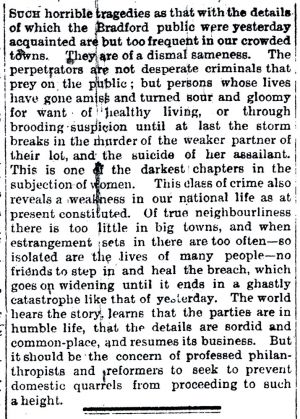
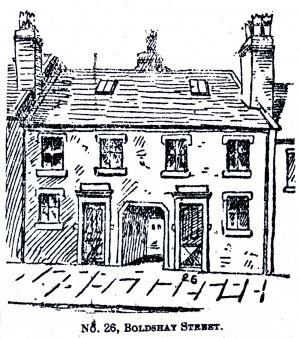
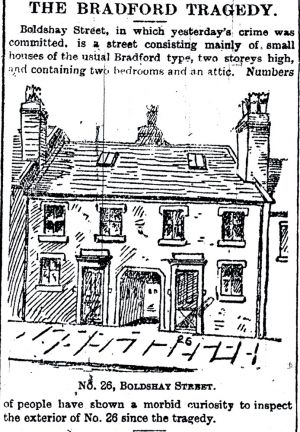
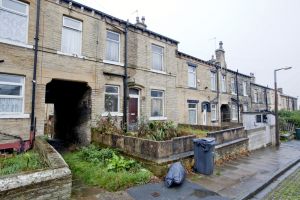
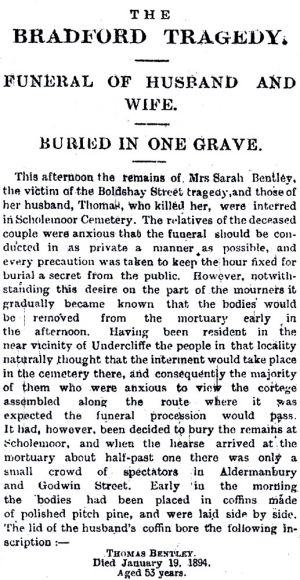
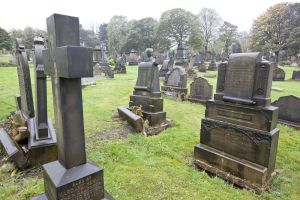
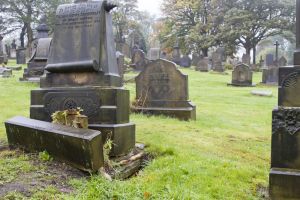
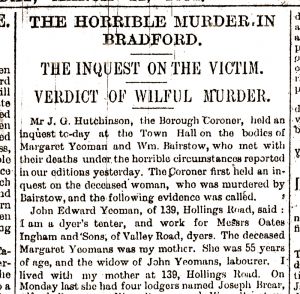
, Saturday, January 27, 1894 thomas bentley 1 sm.jpg)